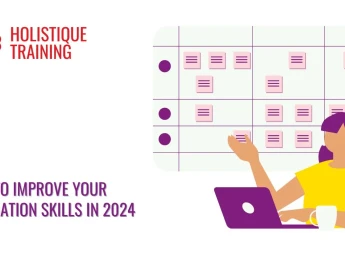- Table of Contents
- Introduction
- What is Delegation?
- Why is Delegation Important?
- Efficiency and Productivity:
- Skill Development:
- Empowerment and Motivation:
- Enhanced Decision-Making:
- Succession Planning:
- Work-Life Balance:
- Innovation and Creativity:
- Increasing Revenue:
- When Do You Need to Delegate Work?
- When Workload Becomes Overwhelming:
- When Team Members Have the Skills:
- When Tasks Are Routine or Repetitive:
- When Team Members Are Ready for More Responsibility:
- When Strategic Initiatives Are in Play:
- When Facing Deadlines:
- When Specialisation is Required:
- When Encouraging Team Collaboration:
- When Employees Request More Opportunities:
- When You're Seeking New Perspectives:
- What Stops Managers from Delegating?
- Fear of Losing Control:
- Perfectionism:
- Lack of Trust:
- Insufficient Time for Training:
- Unclear Objectives and Expectations:
- Cultural Resistance:
- Inexperience with Delegation:
- Overemphasis on Individual Achievement:
- Fear of Change:
- Delegation in the Three-Dimensional Leadership Model
- Task Management:
- Relationship Building:
- Personal Growth:
- 8 Delegation Tips for Managers
- Define Clear Objectives:
- Match Tasks to Skills:
- Provide the Necessary Resources:
- Encourage Autonomy:
- Set Deadlines:
- Check-In Regularly:
- Acknowledge Contributions:
- Learn to Let Go:
- What are the Top Delegation Skills?
- Communication Skills:
- Trust-Building:
- Assessment and Evaluation:
- Time Management:
- Decision-Making Skills:
- Mentoring and Coaching:
- Conflict Resolution:
- Flexibility and Adaptability:
- Strategic Thinking:
- Empathy and Emotional Intelligence:
- Best Ways to Improve Your Delegation Skills
- Reflect on Past Experiences:
- Seek Feedback from Your Team:
- Set Clear Goals and Expectations:
- Practise Active Listening:
- Start Small:
- Monitor Progress and Provide Support:
- Embrace Mistakes as Learning Opportunities:
- Invest in Personal Development:
- Cultivate a Supportive Team Culture:
- Regularly Reassess Your Delegation Approach:
- Conclusion
Introduction
Effective delegation is an essential skill that separates great leaders from average ones. Many managers struggle with the concept, often believing that delegating tasks might reflect a lack of capability on their part. However, delegation is about empowering others, promoting team collaboration, and ultimately achieving organisational goals more efficiently. This blog post explores the nuances of delegation, its significance, the barriers to effective delegation, practical tips for managers, essential delegation skills, and methods for improving these vital abilities.
What is Delegation?
Delegation involves assigning responsibility for a specific task or decision to another person while maintaining accountability for the outcome. It is a critical management function that allows leaders to distribute their workload and optimise the productivity of their team members. Effective delegation is not merely about handing off tasks; it involves selecting the right person for the job, providing clear instructions, and ensuring that the delegated task aligns with the individual's skills and professional development goals.
When managers delegate effectively, they not only lighten their own workload but also foster a culture of trust and engagement within their teams. This can improve morale, higher job satisfaction, and enhance productivity.
Why is Delegation Important?
According toCEO Review, leaders who excel at delegation experience an average revenue boost of 33%, along with notably reduced employee turnover. This is largely because their team members feel empowered and appreciated, thanks to the sense of individual responsibility entrusted to them - which we will discuss more deeply in a minute. That said, here are the key reasons that underline the importance of delegation:
Efficiency and Productivity:
One of the primary benefits of delegation is increased efficiency. Managers often juggle multiple responsibilities, and attempting to handle every task personally can lead to burnout and reduced productivity. By delegating tasks, managers can focus on high-level strategic initiatives that require their expertise while allowing capable team members to take on day-to-day operations. This division of labour helps ensure that all tasks are completed promptly, leading to a more productive work environment.
Skill Development:
Delegation provides employees with opportunities to learn and grow. Managers delegating tasks allows team members to stretch their abilities and acquire new skills. This process enhances individual competencies and strengthens the team's overall capabilities. Over time, team members become more proficient and confident in their roles, which benefits the organisation as a whole. Moreover, skill development through delegation prepares employees for future leadership positions, creating a robust talent pipeline.
Empowerment and Motivation:
Empowering team members through delegation can significantly boost their morale. When entrusted with responsibilities, individuals feel valued and recognised for their contributions. This sense of ownership fosters a positive work environment, where employees are more motivated to excel. Motivated employees are typically more engaged and committed to their work, resulting in higher productivity and job satisfaction. Additionally, empowered teams are likelier to take initiative, solve problems independently, and contribute innovative ideas.
Enhanced Decision-Making:
Delegation allows managers to leverage their team members' diverse perspectives and expertise. By distributing decision-making authority, managers can tap into the unique insights of individuals who may have specialised knowledge or experience related to the task at hand. This collaborative approach leads to more informed decision-making, ultimately benefiting the organisation. Furthermore, when employees are involved in the decision-making process, they are more likely to buy into the outcomes and work towards achieving them.
Succession Planning:
Effective delegation is a cornerstone of succession planning. As organisations grow and evolve, having a pipeline of capable leaders is essential for long-term success. By delegating responsibilities and providing opportunities for team members to take on more significant roles, managers can identify high-potential employees and groom them for future leadership positions. This proactive approach to talent development ensures that the organisation is well-prepared for future transitions and challenges.
Work-Life Balance:
In 2021, a survey cited byBBC involving over 9,000 UK workers found that 65% of job seekers prioritised work-life balance over salary and benefits. A similar trend was observed in the US, where 63% of 4,000 FlexJobs 2022 Career Pulse Survey respondents indicated they preferred work-life balance to higher pay. For managers, delegation is not just about improving team performance; it is also crucial for personal well-being. By sharing responsibilities, managers can create a healthier work-life balance, reducing stress and preventing burnout. This balance allows leaders to recharge, maintain their creativity, and focus on strategic thinking, which is essential for effective leadership. In turn, a healthier work-life balance sets a positive example for team members, encouraging them to prioritise their well-being as well.
Innovation and Creativity:
When managers delegate tasks, they free up mental space for more innovative thinking. Managers can dedicate more time to brainstorming and developing creative solutions to complex challenges by allowing team members to handle routine responsibilities. Furthermore, when employees are empowered to take on responsibilities, they may introduce fresh perspectives and innovative ideas to improve processes, products, or services.
Increasing Revenue:
Delegation can directly impact an organisation's bottom line by streamlining processes and improving overall efficiency. When managers delegate tasks effectively, they can concentrate on strategic initiatives that drive revenue growth, such as sales, marketing, and customer engagement. By empowering team members to take ownership of operational tasks, managers can create a more agile and responsive organisation that can quickly seize market opportunities. This increased responsiveness improves customer satisfaction and retention, ultimately driving higher sales and profits. Furthermore, organisations can reduce reliance on external resources by developing a capable team through delegation, saving costs and enhancing profitability over time.
In summary, delegation is a critical leadership skill contributes to efficiency, skill development, employee empowerment, enhanced decision-making, and effective succession planning. By recognising the importance of delegation, managers can foster a culture of collaboration and growth, ultimately leading to improved individual and organisational performance.
When Do You Need to Delegate Work?
Understanding when to delegate work is a crucial skill for effective management. Recognising the right moments to pass tasks onto team members can enhance productivity, foster professional growth, and ensure the smooth operation of projects. Here are several key scenarios in which managers should consider delegation:
When Workload Becomes Overwhelming:
One of the clearest signs that it's time to delegate is when a manager is overwhelmed with tasks. When job demands exceed personal capacity, delegation becomes essential to maintaining efficiency and preventing burnout. By sharing responsibilities, managers can alleviate stress, ensure that all tasks receive adequate attention, and avoid compromising the quality of their work. This is particularly important during peak periods or when unexpected projects arise, making it crucial for managers to identify which tasks can be delegated to capable team members.
When Team Members Have the Skills:
Effective delegation occurs when managers recognise the strengths and skills of their team members. If an employee possesses the necessary competencies or is interested in developing specific skills, delegating tasks related to those areas can be beneficial. This not only empowers the employees but also allows them to grow professionally. By identifying and leveraging the unique talents of team members, managers can enhance overall team performance and job satisfaction.
When Tasks Are Routine or Repetitive:
Routine or repetitive tasks often consume valuable time that could be better spent on strategic planning and higher-level responsibilities. Delegating these tasks to team members allows managers to focus on critical projects that require their expertise and decision-making abilities. This enhances overall productivity and ensures that team members are engaged in meaningful work, rather than becoming bogged down by monotonous tasks.
When Team Members Are Ready for More Responsibility:
Delegation is a vital tool for developing future leaders within an organisation. When managers observe that team members are ready to take on more responsibility, delegating challenging tasks is an excellent opportunity. This approach helps build their confidence and encourages skill development. Managers should assess individual readiness based on performance and aspirations, providing support and guidance as needed.
When Strategic Initiatives Are in Play:
Delegation is essential during strategic planning or when implementing new initiatives. Managers must ensure that the workload is balanced to achieve organisational goals effectively. Delegating tasks related to strategic projects allows managers to focus on high-level decision-making and problem-solving, ensuring that initiatives progress smoothly. Additionally, involving team members in strategic tasks fosters a sense of ownership and engagement, leading to more successful outcomes.
When Facing Deadlines:
Tight deadlines often necessitate task delegation. When projects are on a tight schedule, it's essential to distribute the workload among team members to meet deadlines without sacrificing quality. Effective delegation in this context can lead to faster task completion while allowing managers to oversee the overall project. By sharing responsibilities, managers can ensure that critical milestones are met while empowering team members to contribute actively to the project's success.
When Specialisation is Required:
In many instances, specific tasks may require specialised knowledge or skills that some team members possess. When this expertise is available within the team, it is advantageous for managers to delegate those tasks. Not only does this ensure that the work is completed to a high standard, but it also allows managers to leverage their team's unique capabilities. By recognising and utilising individual strengths, managers can enhance overall team effectiveness.
When Encouraging Team Collaboration:
Delegation can also be an opportunity to foster collaboration within the team. Managers can encourage teamwork and communication by distributing tasks that require collective input or effort. This approach leads to more innovative solutions and helps build a sense of camaraderie among team members. Encouraging collaboration through delegation enhances team dynamics and leads to improved overall performance.
When Employees Request More Opportunities:
When team members desire more responsibility or new challenges, managers should consider delegating relevant tasks. This demonstrates a commitment to employee development and creates an environment that values growth and initiative. By responding positively to such requests, managers can cultivate a motivated workforce eager to contribute to the organisation’s success.
When You're Seeking New Perspectives:
Sometimes, managers may become too close to a project or issue, limiting their ability to see potential solutions. Delegating tasks to different team members can provide fresh perspectives and ideas, which may lead to innovative approaches. By involving others in the decision-making process, managers can tap into diverse viewpoints, enriching the overall outcome and fostering a more inclusive work environment.
Recognising when to delegate work is an essential skill for effective leadership. By assessing workload, team capabilities, and strategic needs, managers can make informed decisions about delegation that enhance productivity and empower team members. Embracing delegation alleviates individual stress and promotes a collaborative and engaged workplace culture, ultimately leading to organisational success.
What Stops Managers from Delegating?
Despite the many benefits of delegation, numerous obstacles can prevent managers from effectively assigning tasks to their team members. Understanding these barriers is essential for overcoming them and creating a more productive work environment. Here are some common reasons that inhibit managers from delegating:
Fear of Losing Control:
One of the most significant barriers to delegation is the fear that managers will lose control over task outcomes. This apprehension can stem from a lack of trust in team members’ abilities or a belief that only they can achieve the desired results. Managers may worry that delegating tasks could lead to mistakes, which might reflect poorly on them or the organisation. This fear can result in micromanagement, where managers attempt to oversee every task detail, ultimately stifling their team’s autonomy and initiative.
Perfectionism:
Managers who have perfectionist tendencies may struggle to delegate tasks effectively. They might feel that no one else can perform the task to their exacting standards, leading to a reluctance to hand off responsibilities. This mindset can create a cycle of overburdening themselves with work, as they attempt to do everything perfectly. Perfectionism hinders delegation and contributes to burnout, as managers become overwhelmed by their workload.
Lack of Trust:
Trust is a fundamental element of effective delegation. Managers who lack confidence in their team members’ skills or commitment are less likely to delegate. This distrust can be rooted in past experiences where tasks were not completed satisfactorily or fears that team members may not take the responsibility seriously. Without a strong foundation of trust, managers may revert to handling tasks themselves, missing out on the benefits of empowering their team.
Insufficient Time for Training:
Some managers may feel they lack time to provide proper guidance or training for team members when delegating tasks. They might believe it would be quicker to do the job themselves rather than invest time in instructing someone else. This shortsighted approach can prevent employees from developing the necessary skills and confidence to handle future responsibilities. Ultimately, it reinforces a cycle where managers remain overloaded with tasks and teams miss out on growth opportunities.
Unclear Objectives and Expectations:
When managers have not clearly defined objectives or expectations for a task, it becomes challenging to delegate effectively. Ambiguity can lead to confusion among team members about their roles and responsibilities, resulting in inadequate performance. If managers are unsure about the desired outcomes, they may hesitate to delegate, fearing that the lack of clarity will lead to unsatisfactory results.
Cultural Resistance:
Organisational culture can significantly influence a manager’s willingness to delegate. Managers may be hesitant to delegate tasks in environments where individual contributions are heavily emphasised or where failure is stigmatised. This cultural resistance to shared responsibility can create a climate of competition rather than collaboration, further discouraging effective delegation.
Inexperience with Delegation:
For some managers, especially those new to leadership roles, a lack of experience with delegation can create uncertainty. They may be unsure about how to identify suitable tasks to delegate, which team members to entrust, or how to communicate effectively. This inexperience can lead to hesitation or avoidance of delegation altogether, resulting in a heavier workload and increased stress.
Overemphasis on Individual Achievement:
Managers who prioritise personal achievement over team success may struggle to delegate. They may view delegation as a sign of weakness or believe that taking on more responsibilities showcases their capabilities. This mindset can lead to an inability to recognise the value of teamwork and collaboration, ultimately hindering both their own effectiveness and that of the team.
Fear of Change:
Change can be daunting, especially in established teams with long-standing practices. Managers who have always handled specific tasks themselves may resist delegation due to the uncertainty of how it will impact their work processes and team dynamics. This fear of change can lead to a reluctance to adapt their leadership style, preventing the organisation from benefiting from more collaborative approaches.
Recognising the barriers that prevent effective delegation is the first step toward overcoming them. Managers can cultivate a more productive and empowered workforce by addressing fears of losing control, perfectionism, lack of trust, and cultural resistance. Embracing delegation as a critical leadership skill enhances individual performance and fosters a collaborative environment that drives organisational success. As managers work to eliminate these obstacles, they will unlock the potential of their teams and create a more efficient, engaged, and innovative workplace.
Delegation in the Three-Dimensional Leadership Model
The Three-Dimensional Leadership Model is a holistic approach that emphasises the interconnectedness of various leadership dimensions: task management, relationship building, and personal growth. Within this framework, delegation is critical in enhancing leadership effectiveness across all three dimensions. Understanding how delegation intersects with these aspects can help leaders foster a more dynamic and engaged work environment.
Task Management:
Effective delegation is crucial for efficient task management. By entrusting responsibilities to team members, leaders can optimise their time and resources, allowing them to focus on strategic decision-making and high-priority projects. Delegation helps to distribute the workload evenly, preventing burnout and ensuring that tasks are completed promptly. In a rapidly changing business landscape, the ability to delegate effectively enables leaders to remain agile and responsive to new challenges and opportunities.
Relationship Building:
Delegation fosters trust and collaboration within teams. When leaders delegate tasks, they demonstrate confidence in their team members’ abilities, enhancing morale and job satisfaction. Entrusting responsibilities encourages open communication and a sense of ownership among team members. As relationships strengthen through successful delegation, team members are more likely to engage actively and contribute ideas, leading to improved creativity and innovation. Moreover, strong relationships built through delegation can facilitate conflict resolution and promote a positive team culture.
Personal Growth:
Delegating tasks benefits the team and contributes to the personal growth of both leaders and team members. For leaders, practising delegation can enhance their strategic thinking and decision-making skills as they learn to assess the capabilities of their team members and identify the right tasks to delegate. For team members, receiving delegated responsibilities provides opportunities for skill development and professional growth. As they tackle new challenges, they gain confidence and experience, which can prepare them for future leadership roles. This cycle of delegation and growth ultimately leads to a more capable and resilient organisation.
In short, understanding the importance of delegation within the Three-Dimensional Leadership Model underscores its significance in effective leadership. Leaders can cultivate a more engaged and empowered workforce by leveraging delegation as a tool for task management, relationship building, and personal growth. This comprehensive approach enhances individual performance and contributes to the organisation's overall success. As managers strive to embrace delegation, they can create a culture that supports collaboration, innovation, and continuous improvement.
8 Delegation Tips for Managers
A statisticreveals that approximately 30% of managers believe they can delegate effectively, yet only 33% of those are perceived as effective delegators by their teams. Effective delegation is a blend of strategy, communication, and trust. By employing practical tips, managers can enhance their delegation skills, empowering their teams and improving overall productivity. Here are eight valuable tips to consider when delegating tasks:
Define Clear Objectives:
Before delegating any task, it’s essential to articulate clear objectives and outcomes. This means specifying what needs to be accomplished, the standards expected, and any deadlines involved. A well-defined scope helps team members understand their responsibilities and align their efforts with the organisation's broader goals. Clear objectives serve as a reference point, making it easier to assess progress and ensure everyone is on the same page.
Match Tasks to Skills:
Understanding each team member's unique strengths and weaknesses is crucial for effective delegation. Take the time to assess individual skills, experiences, and interests and delegate tasks accordingly. For instance, if a team member excels in data analysis, assigning them a project that requires statistical evaluation will likely yield better results. Matching tasks to skills not only enhances the quality of the work produced but also fosters a sense of competence and confidence in team members.
Provide the Necessary Resources:
Successful delegation involves more than just assigning tasks; it also requires providing the necessary resources and support for team members to succeed. This may include access to tools,training, information, or even time for consultation. Ensure that employees have everything they need to complete the task effectively. Doing so empowers them to take ownership of their work and minimise potential roadblocks that could hinder their progress.
Encourage Autonomy:
Once a task has been delegated, it’s essential to step back and allow team members the freedom to approach the work in their own way. Avoid micromanaging or imposing overly rigid guidelines, as this can stifle creativity and lead to frustration. Trusting team members to use their judgement fosters a sense of ownership, encourages innovative problem-solving, and ultimately leads to higher job satisfaction. Allowing autonomy also enables employees to develop their decision-making skills, preparing them for future challenges.
Set Deadlines:
Establishing clear deadlines is critical for effective delegation. Deadlines create a sense of urgency and accountability, ensuring that tasks are completed on time. When setting deadlines, consider both the task's complexity and the team member's capabilities. Communicate these deadlines clearly and check in periodically to monitor progress. This helps maintain momentum and keeps everyone focused on meeting the established timeline.
Check-In Regularly:
Regular check-ins are an essential part of the delegation process. Schedule brief meetings or touchpoints to assess progress, address any challenges, and provide feedback. These check-ins allow managers to offer guidance and support while ensuring that team members stay on track. However, it’s important to strike a balance; while check-ins are valuable, avoid turning them into micromanagement sessions. The goal is to maintain open communication without undermining the autonomy granted to team members.
Acknowledge Contributions:
Recognition plays a pivotal role in motivating team members. Acknowledge and celebrate the efforts and achievements of individuals who successfully complete delegated tasks. This can be done through verbal praise, written acknowledgements, or even team celebrations. Recognition not only reinforces positive behaviour but also encourages team members to take on more responsibilities in the future. When employees feel valued and appreciated, they are more likely to engage fully in their work and contribute to the team's success.
Learn to Let Go:
One of the most challenging aspects of delegation is the ability to let go of control. Managers must recognise that they cannot do everything themselves and that delegating is an opportunity for growth, both for themselves and their team. They must embrace the idea that mistakes are part of the learning process and can lead to valuable insights. By letting go of the need for perfection, managers create a culture where team members feel safe to experiment, take risks, and learn from their experiences.
Implementing these eight delegation tips can significantly improve a manager’s ability to delegate effectively. By defining clear objectives, matching tasks to skills, providing necessary resources, encouraging autonomy, setting deadlines, conducting regular check-ins, acknowledging contributions, and learning to let go, managers can foster a culture of collaboration and trust within their teams. This enhances team performance and contributes to individual growth and development, ultimately leading to a more efficient and dynamic workplace.
Metric | Description |
Task Completion Rate | Percentage of delegated tasks completed on time. |
Employee Engagement Level | Measure of team morale and involvement. |
Skill Acquisition Rate | Rate at which team members learn new skills. |
Feedback Quality | Quality and relevance of feedback received. |
Revenue Impact | Changes in revenue linked to delegated tasks. |
Table: Metrics to measure the effectiveness of delegation
What are the Top Delegation Skills?
Effective delegation requires a unique skill set beyond simply assigning tasks. Managers who excel at delegation possess several key competencies that enable them to empower their teams and achieve organisational goals. Here are the top delegation skills that every manager should cultivate:
Communication Skills:
Clear andeffective communication is fundamental to successful delegation. Managers must articulate their expectations, objectives, and desired outcomes in a way that team members easily understand. This involves not only verbal and written communication but also active listening skills to ensure that any questions or concerns are addressed. Good communication fosters a collaborative environment, where team members feel comfortable discussing progress and challenges.
Trust-Building:
Trust is the cornerstone of effective delegation. Managers must demonstrate confidence in their team members' abilities and judgement. Building trust involves consistently showing appreciation for employees’ skills, being transparent about decision-making, and allowing team members the autonomy to complete tasks as they see fit. When trust exists within a team, delegation becomes more natural, as employees feel empowered to take ownership of their responsibilities.
Assessment and Evaluation:
The ability to assess team members’ strengths, weaknesses, and workloads is critical for effective delegation. Managers should be skilled in evaluating who is best suited for each task based on their skill sets, experience, and interests. This requires a keen understanding of the team’s dynamics and the ability to match tasks with individuals to maximise productivity and morale. Ongoing evaluation after delegation is equally important, allowing managers to identify areas for improvement and provide feedback as needed.
Time Management:
Delegation often involves tight deadlines and multiple tasks being assigned at once. Effective managers must be skilled in time management, both for themselves and their teams. This means prioritising tasks, setting realistic deadlines, and allocating resources efficiently. Managers should also encourage team members to manage their time effectively by teaching them how to break down projects into manageable parts and set individual timelines.
Decision-Making Skills:
Delegation frequently involves making decisions about task assignments and resource allocation. Managers must be decisive and able to make informed choices quickly. This skill encompasses evaluating potential outcomes, weighing risks, and considering the implications of each decision on team dynamics and project success. Effectivedecision-making also requires adapting and adjusting plans as needed based on changing circumstances.
Mentoring and Coaching:
A great manager understands that delegation is not just about assigning tasks; it’s also about mentoring team members through the process. Managers should develop their coaching skills to guide employees in their development. This involves providing constructive feedback, sharing knowledge, and encouraging team members to take on new challenges. By investing in their employees’ growth, managers not only enhance the team’s capabilities but also build loyalty and engagement.
Conflict Resolution:
Conflicts may arise during the delegation process, whether related to differing opinions on task execution or interpersonal issues among team members. Managers must possess conflict resolution skills to address these challenges constructively. This involves actively listening to all parties, facilitating discussions to understand different perspectives, and working collaboratively to find solutions. Being skilled in conflict resolution maintains team harmony and reinforces a culture of open communication and collaboration.
Flexibility and Adaptability:
Adapting to changing circumstances is vital in a dynamic work environment. Managers must be flexible in their approach to delegation, recognising that situations can evolve quickly, and priorities may shift. This means being willing to adjust assignments, deadlines, or resources as needed while remaining focused on overall goals. Flexibility encourages a culture of innovation, where team members feel empowered to try new approaches and propose improvements.
Strategic Thinking:
Effective delegation requires a strategic mindset. Managers should be able to see the bigger picture and understand how delegated tasks fit into broader organisational objectives. This involves setting priorities based on company goals and making decisions that align with the organisation’s vision. Strategic thinking ensures managers delegate tasks that benefit individual team members and contribute to the organisation's overall success.
Empathy and Emotional Intelligence:
Understanding team members' emotions and motivations is essential for effective delegation. Managers with high emotional intelligence can gauge how employees feel about their workloads, challenges, and accomplishments. This empathy enables managers to tailor their delegation strategies to meet individual needs, fostering a supportive work environment. By recognising and addressing the emotional aspects of delegation, managers can build stronger relationships with their teams and improve overall morale.
Cultivating these top delegation skills is essential for managers seeking to enhance their leadership effectiveness. By honing communication, trust-building, assessment, time management, decision-making, mentoring, conflict resolution, flexibility, strategic thinking, and emotional intelligence, managers can create a thriving team culture where delegation becomes a powerful tool for success. These skills empower individual team members and contribute to the organisation’s overall productivity and innovation, ultimately leading to a more dynamic and resilient workplace.
Best Ways to Improve Your Delegation Skills
Enhancing delegation skills is an ongoing process that requires self-awareness, practice, and a willingness to learn. By implementing targeted strategies, managers can develop their ability to delegate effectively, leading to improved team performance and greater organisational success. Here are some of the best ways to refine your delegation skills:
Reflect on Past Experiences:
Take the time to analyse your previous experiences with delegation, both successful and unsuccessful. Consider what worked well and what didn’t, and identify the factors contributing to those outcomes. Reflecting on these experiences will help you understand your strengths and areas for improvement, enabling you to make more informed decisions in the future. This self-assessment can also reveal patterns in your delegation approach, allowing you to adjust your methods accordingly.
Seek Feedback from Your Team:
Encouraging open communication and feedback from your team is crucial for developing effective delegation skills. Ask team members how they feel about the assigned tasks and whether they have the resources and support they need to succeed. Solicit feedback on your delegation style, including areas where they think you could improve. By creating a culture of transparency, you demonstrate your commitment to their growth and foster an environment of collaboration and trust.
Set Clear Goals and Expectations:
To improve your delegation skills, it’s important to establish clear goals and expectations for each task you delegate. This involves not only defining the specific outcomes you want but also explaining the reasoning behind the delegation. Providing context helps team members understand the importance of their contributions and how they align with broader organisational objectives. Clarity in goals and expectations reduces confusion and empowers employees to take ownership of their responsibilities.
Practise Active Listening:
Effective delegation requires strong listening skills. Make a conscious effort to listen actively to your team members’ concerns, ideas, and feedback. This not only helps you understand their perspectives but also builds trust and rapport within the team. When employees feel heard, they are more likely to engage fully with their tasks and take initiative. Active listening also lets you identify potential challenges early on, allowing you to address them proactively.
Start Small:
If you are new to delegation or find it challenging, begin by delegating smaller tasks. This allows you to build confidence and develop your skills gradually. Choose tasks that are less critical and can be completed quickly. You can progressively delegate more significant responsibilities as you gain experience and observe successful outcomes. Starting small helps you learn how to effectively communicate expectations, provide feedback, and assess performance without feeling overwhelmed.
Monitor Progress and Provide Support:
After delegating tasks, it’s essential to monitor progress without micromanaging. Establish regular check-ins to discuss updates, challenges, and successes. These meetings create opportunities for you to provide guidance and support, ensuring that team members feel equipped to handle their responsibilities. Encourage open dialogue during these check-ins, allowing employees to voice any concerns or ask for help when needed. This balanced approach fosters accountability while maintaining a sense of autonomy.
Embrace Mistakes as Learning Opportunities:
Mistakes are an inevitable part of the delegation process. Instead of viewing them as failures, consider them valuable learning opportunities. When things are unplanned, analyse the situation collaboratively with your team. Discuss what went wrong and how it can be avoided in the future. This approach not only encourages a growth mindset but also fosters resilience and adaptability within the team. By normalising mistakes as part of the learning process, you create a safe environment for innovation and creativity.
Invest in Personal Development:
Continuous personal development is essential for improving delegation skills. Consider enrolling in management training programs, workshops, or online courses that focus on leadership and delegation. Reading books or articles on effective delegation can also provide valuable insights and practical tips. Additionally, seek mentorship from experienced leaders who can share their knowledge and expertise. Investing in your personal growth will enhance your delegation abilities and positively impact your leadership style.
Cultivate a Supportive Team Culture:
Foster a team culture that values collaboration, accountability, and empowerment. Encourage team members to take initiative and share ideas, creating an environment where everyone feels comfortable contributing. Recognise and celebrate the achievements of individuals and the team as a whole, reinforcing the importance of collective effort. A supportive culture boosts morale and encourages team members to embrace their roles and responsibilities enthusiastically.
Regularly Reassess Your Delegation Approach:
Delegation is not a one-time effort; it requires regular reassessment and adjustment. Periodically evaluate your delegation strategies to identify what’s working well and what needs improvement. Consider factors such as team dynamics, workload distribution, and communication effectiveness. Be open to experimenting with new approaches and techniques to find the most effective methods for your team. This iterative reassessment process will enhance your delegation skills over time and ensure that you remain adaptable to changing circumstances.
Improving delegation skills is a journey that requires dedication, reflection, and a commitment to continuous growth. By actively engaging in self-reflection, seeking feedback, setting clear expectations, practising active listening, starting small, monitoring progress, embracing mistakes, investing in personal development, cultivating a supportive culture, and regularly reassessing your approach, you can significantly enhance your delegation capabilities. As you develop these skills, you will empower your team members to excel in their roles and create a more efficient and collaborative work environment that drives organisational success.
Conclusion
Improving delegation skills is a vital aspect of effective leadership. Managers can foster a more engaged, empowered, and productive team by understanding the intricacies of delegation and implementing practical strategies. Overcoming barriers to delegation and embracing the process can significantly transform both personal leadership effectiveness and organisational success. Through ongoing practice, reflection, and commitment to growth, managers can master the art of delegation and unlock the full potential of their teams.
To further enhance your delegation and strategic planning skills, consider enrolling in our course,Strategic Planning and Effective Delegation. This comprehensive program provides actionable insights and expert guidance to help you develop a robust delegation framework tailored to your organisation's needs. Join us to transform your leadership approach and empower your team for sustained success. Enrol now by clicking the link below!

























